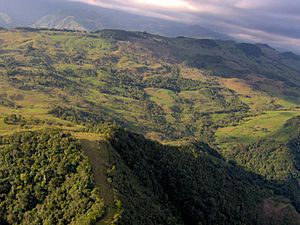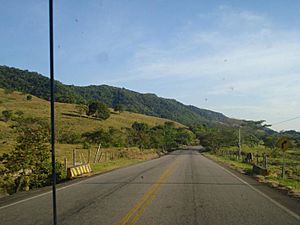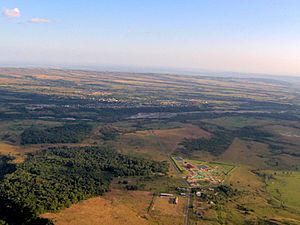Monterrey, Casanare facts for kids
Quick facts for kids
Monterrey, Casanare
|
|||
|---|---|---|---|
|
Municipality and town
|
|||
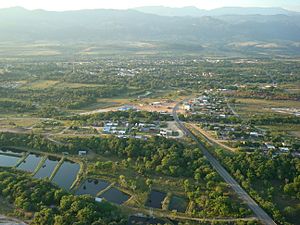
Panorama of Monterrey
|
|||
|
|||
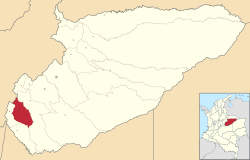
Location of the municipality and town of Monterrey, Casanare in the Casanare Department of Colombia.
|
|||
| Country | |||
| Region | Orinoquía Region | ||
| Department | Casanare Department | ||
| Foundation | 6 September 1953 | ||
| Area | |||
| • Total | 879 km2 (339 sq mi) | ||
| Population
(Census 2018)
|
|||
| • Total | 14,828 | ||
| • Density | 16.869/km2 (43.691/sq mi) | ||
| Time zone | UTC-5 (Colombia Standard Time) | ||
| Website | http://www.monterrey-casanare.gov.co/ (Spanish) | ||
Monterrey is a town and a special area called a municipality in Casanare Department, Colombia. It's about 105 kilometers southwest of Yopal, which is the main city of Casanare.
This town was started on September 6, 1953. It became an official municipality in 1960. Monterrey covers about 879 square kilometers and is home to around 14,831 people.
Contents
History of Monterrey
Before the Spanish arrived, the Muisca people lived in this area. They had a very advanced way of life and culture in what is now Colombia. The Spanish started taking over the land in 1499, and this process lasted until 1550. After the conquest, the new Spanish government took control of the region and its native people.
Monterrey officially became part of Colombia's government structure in 1821. At that time, Colombia was divided into departments, provinces, cantons, and parishes. Monterrey was first part of the Boyacá Department. Later, after a civil war and a new constitution in 1863, Casanare Department became its own independent department for the first time.
Geography of Monterrey
Where is Monterrey Located?
Monterrey is located in the foothills, which are the lower parts of the Cuchilla Palmichal mountain range. It is about 105 kilometers from Yopal. The town's elevation ranges from 300 meters above sea level near the Túa River to the urban center. The average temperature in Monterrey is about 25 degrees Celsius.
Monterrey's Landforms
Monterrey has many different types of landforms. You can find mountains, foothills, uplands, hills, and valleys here. This variety makes for many beautiful landscapes.
Mountain Areas
The mountains in Monterrey were formed by strong forces deep inside the Earth. These forces folded layers of rock, creating tall, unique shapes. These mountains are on the western side of the municipality. Because of the Earth's movements, the slopes can be very steep, sometimes more than 45%. The mountains range from 800 to 2000 meters above sea level.
Monterrey also has many long, narrow ridges. These are like tall, sharp blades that stand out from the rest of the mountains. They have steep sides because of the strong rocks that make them up, like sandstone.
Upland Areas
The uplands are found in the southern part of Monterrey and in some smaller spots in the town center. These areas are between 300 and 600 meters above sea level. They are mostly flat areas that have been lifted and tilted by geological forces. Water flows slowly here, and the topsoil can wear away easily.
These uplands are surrounded by older, cut-up terraces. The land is mostly flat or gently rolling, with slopes up to 12%. The ground has gravel and ridges on the surface. Water drains through many small, branching streams.
Plain Areas
In Monterrey, the plains are located in two smaller areas: the Southeast and the Northeast. These plains are made of fine soil and other materials brought down by rivers from the mountains. The plains are mostly flat land.
Plants and Animals of Monterrey
Plant Life in Monterrey
Sadly, much of the original plant life in Monterrey has been cut down by people. However, you can still find many shrubs, woody vines, small green plants, and plants that grow on other plants (epiphytes) in the undergrowth. The most common types of plants and trees in the area include:
- Gallery forests (forests along rivers)
- Dacryodes trees
- Tapirira trees
- Mauritia flexuosa palms
- Socratea exorrhiza palms
- Spondias trees
- Guarea trees
- Cecropia trees
Wildlife in Monterrey
Monterrey, like many areas in the Colombian foothills, has less wildlife than it used to. This is because of a lot of hunting and human activity. People have changed natural habitats into farms and pastures.
Birds of Monterrey
Monterrey is home to many different kinds of birds. The Roadside hawk is a very common bird here. Other birds you might see include:
- Herons
- Scarlet Ibis
- Crows
- Jays
- Gray Heron
- Tawny Owls
- Parrots
- Hawks
- Woodpeckers
- Partridges
- Ruddy ground-doves
- Fork-tailed flycatchers
- Yellow Orioles
- Green oropendolas
- Blue-gray tanagers
Mammals of Monterrey
Some of the mammals you might find in Monterrey include:
Culture and Traditions
Monterrey is a place where the Llanero and Joropo cultures are very strong. These cultures come from the plains of Colombia and Venezuela.
The town often has exciting events like beach bullfighting. Since 1997, they have held a Summer Festival on the beaches of the Túa River. During this festival, people enjoy beach sports, adventure activities, and horse riding. The festival also features music groups from the region, special performances by local folk artists, and big orchestras.
See also
 In Spanish: Monterrey (Casanare) para niños
In Spanish: Monterrey (Casanare) para niños




